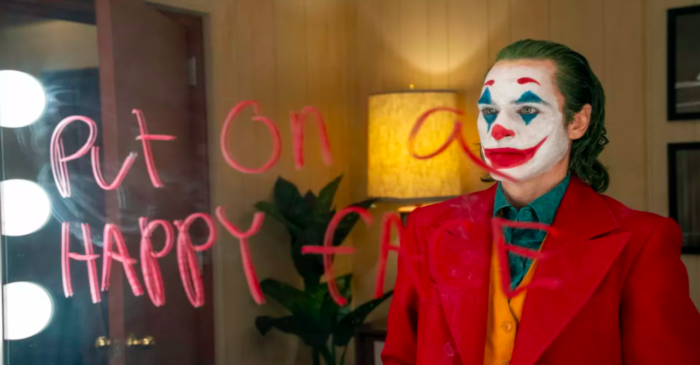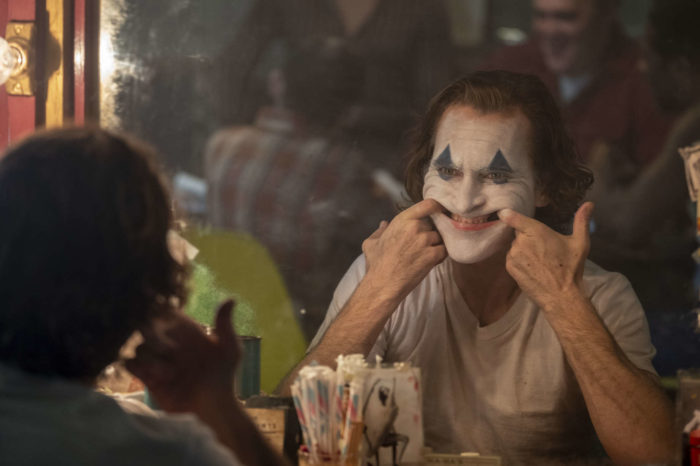The arguments over Joker will be many and misinformed; arguments that will usurp sober analysis and arguments that will dwarf message board flame wars. Those predictable, petty spats are already being snuffed out and sucked up into a political tornado, which has become so volatile that military officials in Oklahoma issued a preemptive warning to service members citing “disturbing and very specific” dark web chatter of potential violence at screenings of the film, which opens Friday on over 4,000 screens across the country.

At the center of the controversy is the question of whether Joker—a gritty, R-rated reimagining of the Batman archnemesis’ origin story—glorifies the radicalization of a disaffected white, American man who commits terroristic acts of violence and chaos. Sound familiar? Director Todd Phillips, who is probably best known for helming the Hangover series of films, added fuel to the firestorm in a recent interview with Vanity Fair, antagonistically deriding “woke culture” for creating an atmosphere in Hollywood anathema to comedy. Hence the gritty reboot of his career.
The above bears mentioning as it forms the backdrop for the highly ambitious and hotly anticipated Joker. It also makes a non-partisan reading of the film virtually impossible. Adding to the fever pitch is the buzz generated by early screenings; Joker’s clout skyrocketed in September when it took home the top prize at the Venice International Film Festival (previous years’ winners include Alfonso Cuaron’s Roma and Guillermo del Toro’s The Shape of Water). Among skeptical cinephiles it begged the question: are superhero movies ready to grow up, move out, and contribute to the larger cinematic conversation?
With a few notable exceptions, including Christopher Nolan’s stately Batman trilogy and the somber X-Men spinoff film Logan, the genre has creatively stagnated over a decade dominated by homogenous, two-dimensional Marvel Studios fare. And in an industry stuck in a state of infinite arrested development, Joker is a jolt to the system. This is a defiantly dark and decidedly adult take on the iconic villain that will electrify audiences—especially those unfamiliar with its most obvious influences.
Both its narrative fiber and its cinematic vocabulary Joker pilfers shamelessly from the work of Martin Scorsese—particularly Taxi Driver and The King of Comedy (the former a violent power fantasy anchored by an unhinged anti-hero and the latter a dark comedy about unchecked celebrity worship… also anchored by an unhinged anti-hero). The parallels between Joker’s Arthur Fleck (Joaquin Phoenix) and Scorsese protagonists Travis Bickle and Rupert Pupkin (Robert De Niro and Robert De Niro, respectively) are blatant, though Phoenix contributes something utterly alien and uniquely his own to the role. His Joker is pompous yet naive, irrational, impulsive, desperate, dangerous, vulnerable.
Fleck is introduced as a down-and-out wannabe comedian cohabitating with his doting, doddering mother in an awful apartment complex somewhere on the wrong side of Gotham. Struggling to hold down a job and keep up on his medication, Fleck flounders impotently from one crisis to the next. By degrees, the daily injustices bubble to a rolling boil and Fleck, beaten and broken, is compelled to strike back. Phoenix is phenomenal throughout, contorting his emaciated body into impossible shapes in one sequence and gracefully dancing down a flight of stairs like Fred Astaire in another.
Unfortunately for Phoenix, Phillips fails to stick the landing. Joker captivates as a transient character study, but it’s a mediocre purveyor of plot; more than one big reveal falls flat because Phillips doesn’t trust the audience to read his heavy-handed cues. Worse, the film’s climax strains believability to the breaking point, undermining an hour and a half of impressive tension, pathos, and worldbuilding. Like the character himself, Joker is a walking contradiction—brilliant and daring yet clumsy and shallow. Its glaring imperfections make the inevitable internet absolutism all the more frustrating.
Arguments over how to read the politics of Joker will be exacerbated by the muddiness of Phillips’ vision; his unwillingness to commit to either an objective or subjective perspective on the character will further enflame the disagreements engulfing the film. “I’m not political,” Fleck insists in the final act, as clown-masked copycats loot and riot across the city. It’s the kind of empty, irrelevant parcel of dialog that sounds a lot like an executive disclaimer—though it does convey the narrative challenge inherent in establishing motive for a figure who is an ultimately unknowable agent of chaos. Could it be that the Joker is just more interesting the less we know about him?
Occasionally, Phillips’ screenplay flirts with radical, Wicked-esque role reversal, suggesting that maybe the wealthy Wayne family are the antagonists and the Joker is a sort of homicidal avenger of the working class. It’s an intriguing avenue for exploration, ultimately abandoned amid concessions to quote-unquote clever connected-universe commercialism that only cheapens the film and undercuts its ambition.
But credit where credit’s due: Joker deserves recognition for forcing a difficult conversation we wouldn’t be having around Dr. Strange or Thor. With any luck, its success will encourage studios and filmmakers to embrace their anarchic instincts and take greater risks with art that pushes boundaries and more meaningfully explores the human drama happening underneath the makeup, behind the mask, and before the cape. That’s a future worth arguing for.
